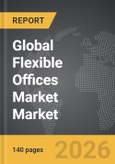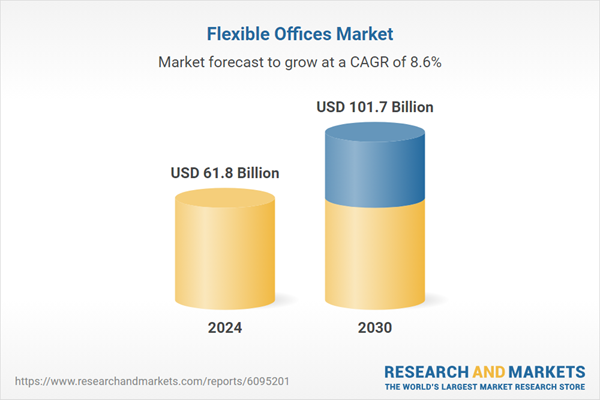Global Flexible Offices Market - Key Trends & Drivers Summarized
Why Are Flexible Offices Reshaping the Future of Workplace Strategy?
Flexible offices - also known as flex spaces, coworking spaces, or serviced offices - are emerging as a transformative force in the global commercial real estate market. These office formats offer businesses short-term leases, shared infrastructure, and customizable layouts that allow them to scale operations with agility. In contrast to traditional long-term leases, flexible offices provide companies - particularly startups, freelancers, and remote teams - with the ability to occupy fully equipped workspaces without capital investment in fit-outs, maintenance, or IT infrastructure.The shift toward hybrid work models post-pandemic has catalyzed the global demand for flexible offices, as companies seek decentralized, employee-centric solutions that balance productivity, collaboration, and cost efficiency. Enterprises are increasingly leveraging flex spaces to establish satellite offices, reduce HQ footprint, or enter new markets without long-term commitments. These offices also offer wellness-focused amenities, collaborative zones, and community-driven environments that appeal to a younger, mobile workforce prioritizing work-life integration. As work evolves from a place to a function, flexible offices are becoming a strategic tool for business continuity and workforce engagement.
What Technologies and Design Elements Are Redefining Flex Spaces?
The modern flexible office is underpinned by smart infrastructure, digital access systems, and experience-driven design. Landlords and operators are deploying IoT-enabled systems for space utilization tracking, air quality monitoring, energy efficiency, and contactless access. Tenants benefit from mobile app integrations that allow for seamless booking of meeting rooms, hot desks, and event spaces. Cloud-based visitor management, high-speed connectivity, and digital collaboration tools are now considered standard inclusions in premium flex offerings.On the design front, flexible offices emphasize modular layouts, biophilic elements, acoustic zoning, and ergonomic furniture that adapt to both individual focus work and team collaboration. Spaces are engineered for versatility - supporting open-plan zones, private pods, breakout lounges, and hybrid meeting rooms in the same environment. Operators are also differentiating themselves through curated experiences, on-site hospitality services, wellness initiatives, and tech concierge support. These innovations are elevating the flex office model from merely a cost-saving alternative to a productivity-enhancing workplace ecosystem.
Which Businesses and Sectors Are Driving Flex Office Adoption?
Adoption of flexible offices spans a wide spectrum of business types and industry verticals. Startups and SMEs have long been key users of flex space due to budget constraints and rapid headcount changes. However, large enterprises, including those in tech, finance, consulting, and media, are increasingly adopting flexible space models to support distributed teams, innovation hubs, and regional expansions. Multinational corporations are negotiating “core + flex” workplace strategies - maintaining core headquarters while supplementing with flexible offices to accommodate hybrid teams or specific projects.Sectors such as legal, education technology, creative industries, and even healthcare administration are also embracing flexible office environments for their speed to occupancy, security features, and ability to foster cross-disciplinary collaboration. Public sector institutions and NGOs are turning to flex offices for cost-effective space solutions in urban centers. The emergence of suburban coworking and community-based flex centers is further expanding access for remote professionals and small enterprises, making flex offices a viable option across both urban and secondary markets.
What Are the Key Drivers Propelling Growth in the Flexible Offices Market?
The growth in the flexible offices market is driven by several factors rooted in evolving workplace models, cost agility, and tenant experience expectations. The acceleration of hybrid and remote work arrangements is a primary catalyst, prompting companies to reevaluate real estate portfolios and seek decentralized, flexible space options. Additionally, economic uncertainty and pressure to reduce fixed costs have pushed firms toward lease models that offer scalability without long-term obligations.Rapid urbanization, digital entrepreneurship, and the rise of knowledge-driven economies are expanding the demand for office space that can flex with business cycles. Landlords and commercial real estate developers are also shifting toward flexible leasing models to maintain occupancy and diversify tenant profiles. Technological enablers - such as workspace-as-a-service platforms and real-time space optimization tools - are making it easier for operators to deliver personalized, efficient, and secure workplace experiences. Together, these drivers are reinforcing flexible offices as a permanent fixture in the future of work, bridging the gap between corporate strategy, workforce dynamics, and space innovation.
Report Scope
The report analyzes the Flexible Offices market, presented in terms of market value (US$). The analysis covers the key segments and geographic regions outlined below:- Segments: Office Type (Coworking Space Offices, Served Offices, Virtual Offices, Hybrid Space Offices); End-Use (IT End-Use, BFSI End-Use, Retail & Consumer End-Use, Other End-Uses).
- Geographic Regions/Countries: World; United States; Canada; Japan; China; Europe (France; Germany; Italy; United Kingdom; and Rest of Europe); Asia-Pacific; Rest of World.
Key Insights:
- Market Growth: Understand the significant growth trajectory of the Coworking Space Offices segment, which is expected to reach US$51.4 Billion by 2030 with a CAGR of a 10.7%. The Served Offices segment is also set to grow at 6.3% CAGR over the analysis period.
- Regional Analysis: Gain insights into the U.S. market, valued at $16.3 Billion in 2024, and China, forecasted to grow at an impressive 8.3% CAGR to reach $16.1 Billion by 2030. Discover growth trends in other key regions, including Japan, Canada, Germany, and the Asia-Pacific.
Why You Should Buy This Report:
- Detailed Market Analysis: Access a thorough analysis of the Global Flexible Offices Market, covering all major geographic regions and market segments.
- Competitive Insights: Get an overview of the competitive landscape, including the market presence of major players across different geographies.
- Future Trends and Drivers: Understand the key trends and drivers shaping the future of the Global Flexible Offices Market.
- Actionable Insights: Benefit from actionable insights that can help you identify new revenue opportunities and make strategic business decisions.
Key Questions Answered:
- How is the Global Flexible Offices Market expected to evolve by 2030?
- What are the main drivers and restraints affecting the market?
- Which market segments will grow the most over the forecast period?
- How will market shares for different regions and segments change by 2030?
- Who are the leading players in the market, and what are their prospects?
Report Features:
- Comprehensive Market Data: Independent analysis of annual sales and market forecasts in US$ Million from 2024 to 2030.
- In-Depth Regional Analysis: Detailed insights into key markets, including the U.S., China, Japan, Canada, Europe, Asia-Pacific, Latin America, Middle East, and Africa.
- Company Profiles: Coverage of players such as 3M Company, Achilles USA, Inc., Addica Industries LLP, Ahlstrom-Munksjö, American Biltrite Inc. and more.
- Complimentary Updates: Receive free report updates for one year to keep you informed of the latest market developments.
Some of the 36 companies featured in this Flexible Offices market report include:
- 91springboard
- Awfis Space Solutions Pvt. Ltd.
- BHIVE Workspace
- Breather
- Convene
- Desana
- Deskimo
- Expansive Workspace
- Flex by JLL
- Flexspace
- Gable
- Garage Society
- Hubble
- IWG plc (Regus, Spaces)
- Impact Hub
- Incuspaze
- Industrious
- Intelligent Office
- JustCo
- Knotel
- LiquidSpace
- Mindspace
- Premier Workspaces
- Servcorp
- The Office Group (TOG)
- Ucommune
- Venture X
- WeWork
- Workstyle Flexible Spaces
This edition integrates the latest global trade and economic shifts into comprehensive market analysis. Key updates include:
- Tariff and Trade Impact: Insights into global tariff negotiations across 180+ countries, with analysis of supply chain turbulence, sourcing disruptions, and geographic realignment. Special focus on 2025 as a pivotal year for trade tensions, including updated perspectives on the Trump-era tariffs.
- Adjusted Forecasts and Analytics: Revised global and regional market forecasts through 2030, incorporating tariff effects, economic uncertainty, and structural changes in globalization. Includes historical analysis from 2015 to 2023.
- Strategic Market Dynamics: Evaluation of revised market prospects, regional outlooks, and key economic indicators such as population and urbanization trends.
- Innovation & Technology Trends: Latest developments in product and process innovation, emerging technologies, and key industry drivers shaping the competitive landscape.
- Competitive Intelligence: Updated global market share estimates for 2025, competitive positioning of major players (Strong/Active/Niche/Trivial), and refined focus on leading global brands and core players.
- Expert Insight & Commentary: Strategic analysis from economists, trade experts, and domain specialists to contextualize market shifts and identify emerging opportunities.
Table of Contents
Companies Mentioned (Partial List)
A selection of companies mentioned in this report includes, but is not limited to:
- 91springboard
- Awfis Space Solutions Pvt. Ltd.
- BHIVE Workspace
- Breather
- Convene
- Desana
- Deskimo
- Expansive Workspace
- Flex by JLL
- Flexspace
- Gable
- Garage Society
- Hubble
- IWG plc (Regus, Spaces)
- Impact Hub
- Incuspaze
- Industrious
- Intelligent Office
- JustCo
- Knotel
- LiquidSpace
- Mindspace
- Premier Workspaces
- Servcorp
- The Office Group (TOG)
- Ucommune
- Venture X
- WeWork
- Workstyle Flexible Spaces
Table Information
| Report Attribute | Details |
|---|---|
| No. of Pages | 140 |
| Published | February 2026 |
| Forecast Period | 2024 - 2030 |
| Estimated Market Value ( USD | $ 61.8 Billion |
| Forecasted Market Value ( USD | $ 101.7 Billion |
| Compound Annual Growth Rate | 8.6% |
| Regions Covered | Global |









